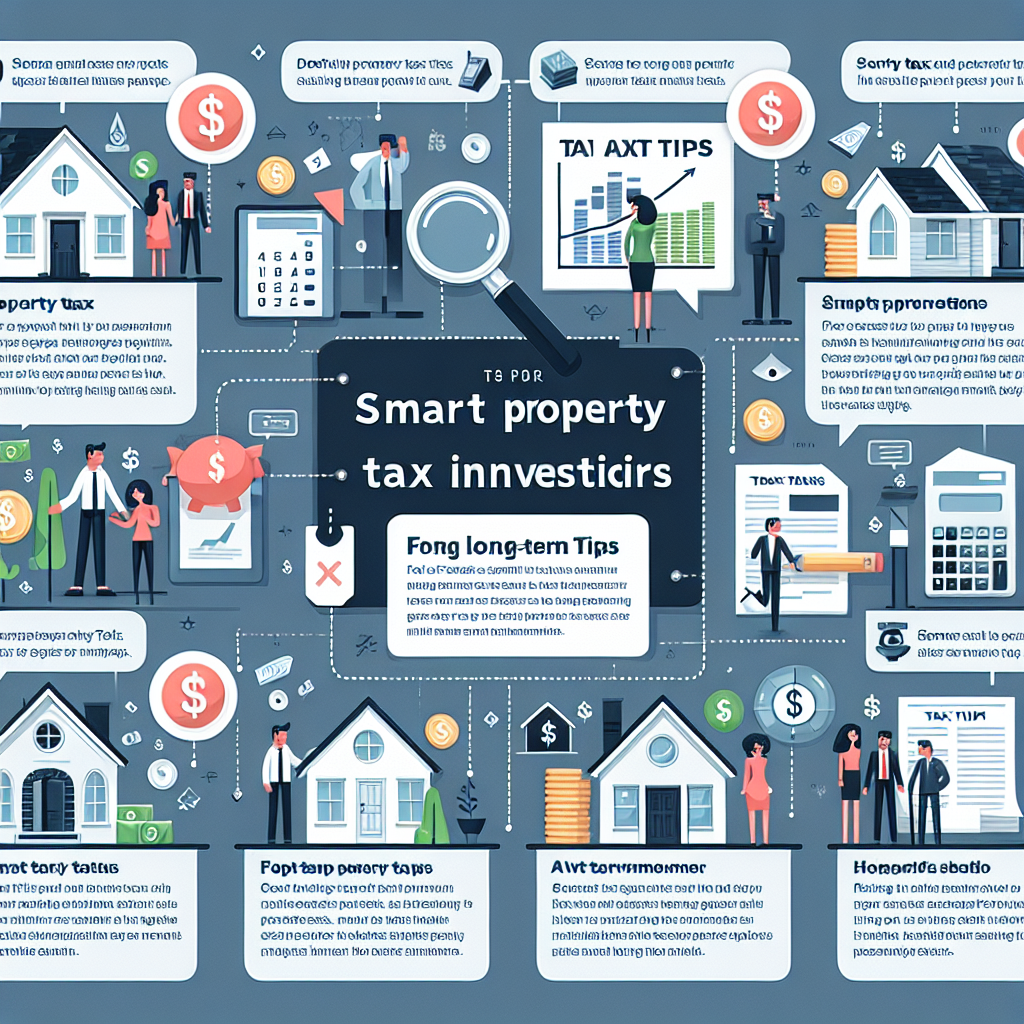-
Table of Contents
- 6 Smart Property Tax Tips for Long-Term Real Estate Investors
- 1. Understand Property Tax Assessments
- How Property Tax Assessments Work
- 2. Take Advantage of Tax Deductions and Credits
- Common Tax Deductions for Real Estate Investors
- Tax Credits for Real Estate Investors
- 3. Utilize 1031 Exchanges
- How 1031 Exchanges Work
- 4. Keep Detailed Records
- What Records to Keep
- 5. Plan for Property Tax Increases
- Strategies to Manage Property Tax Increases
- 6. Consult with Tax Professionals
- Benefits of Working with Tax Professionals
- Case Studies and Examples
- Case Study 1: Successful Property Tax Appeal
- Case Study 2: Utilizing a 1031 Exchange
- Example: Tax Deductions for Rental Property
- Conclusion
6 Smart Property Tax Tips for Long-Term Real Estate Investors

Investing in real estate can be a lucrative venture, but it comes with its own set of challenges, particularly when it comes to property taxes. For long-term real estate investors, understanding and managing property taxes effectively can significantly impact the profitability of their investments. This article delves into six smart property tax tips that can help long-term real estate investors optimize their tax strategies and maximize their returns.
1. Understand Property Tax Assessments
Property tax assessments are the foundation of your property tax bill. Local governments assess the value of your property to determine how much you owe in taxes. Understanding how these assessments work can help you anticipate and manage your tax liabilities more effectively.
How Property Tax Assessments Work
Property tax assessments are typically based on the market value of your property. Assessors use various methods to determine this value, including:
- Comparative Market Analysis (CMA): Assessors compare your property to similar properties that have recently sold in your area.
- Cost Approach: Assessors estimate the cost to replace your property with a similar one, accounting for depreciation.
- Income Approach: For rental properties, assessors may consider the income generated by the property.
It’s crucial to review your property tax assessment regularly. If you believe your property has been overvalued, you can appeal the assessment. Successful appeals can lead to significant tax savings.
2. Take Advantage of Tax Deductions and Credits
Real estate investors can benefit from various tax deductions and credits that can reduce their overall tax burden. Familiarizing yourself with these opportunities can help you save money and improve your investment returns.
Common Tax Deductions for Real Estate Investors
- Mortgage Interest: You can deduct the interest paid on your mortgage, which can be a substantial amount, especially in the early years of the loan.
- Property Taxes: Property taxes paid on investment properties are deductible.
- Depreciation: The IRS allows you to depreciate the value of your property over time, which can result in significant tax savings.
- Repairs and Maintenance: Costs associated with maintaining and repairing your property are deductible.
- Operating Expenses: Expenses such as property management fees, insurance, and utilities are deductible.
Tax Credits for Real Estate Investors
In addition to deductions, there are also tax credits available to real estate investors. For example, the Low-Income Housing Tax Credit (LIHTC) provides incentives for investing in affordable housing. Researching and taking advantage of these credits can further reduce your tax liability.
3. Utilize 1031 Exchanges
A 1031 exchange, named after Section 1031 of the Internal Revenue Code, allows real estate investors to defer capital gains taxes when they sell a property and reinvest the proceeds into a similar property. This strategy can be highly beneficial for long-term investors looking to grow their portfolios without incurring immediate tax liabilities.
How 1031 Exchanges Work
To qualify for a 1031 exchange, you must adhere to specific rules and timelines:
- Like-Kind Property: The property you acquire must be of “like-kind” to the property you sell. Generally, any real estate held for investment purposes qualifies.
- 45-Day Identification Period: You have 45 days from the sale of your property to identify potential replacement properties.
- 180-Day Exchange Period: You must complete the purchase of the replacement property within 180 days of selling your original property.
By deferring capital gains taxes, you can reinvest more capital into new properties, accelerating the growth of your real estate portfolio.
4. Keep Detailed Records
Maintaining detailed records is essential for managing your property taxes effectively. Accurate records can help you substantiate deductions, credits, and other tax benefits, ensuring you maximize your tax savings and avoid potential issues with the IRS.
What Records to Keep
As a real estate investor, you should keep records of the following:
- Purchase and Sale Documents: Keep all documents related to the purchase and sale of your properties, including contracts, closing statements, and deeds.
- Receipts and Invoices: Maintain receipts and invoices for all expenses related to your properties, such as repairs, maintenance, and improvements.
- Mortgage Statements: Keep records of your mortgage payments, including interest and principal amounts.
- Tax Documents: Retain copies of your property tax bills, assessment notices, and any correspondence with tax authorities.
- Rental Income and Expenses: Document all rental income and expenses, including rent payments, property management fees, and utility bills.
Organizing and storing these records systematically can make tax time more manageable and help you take full advantage of available tax benefits.
5. Plan for Property Tax Increases
Property taxes can increase over time due to rising property values, changes in tax rates, and new assessments. Long-term real estate investors should plan for these increases to avoid unexpected financial burdens.
Strategies to Manage Property Tax Increases
- Budgeting: Include potential property tax increases in your budget to ensure you have sufficient funds to cover higher tax bills.
- Appealing Assessments: Regularly review your property tax assessments and appeal them if you believe they are too high.
- Tax Abatement Programs: Research and apply for tax abatement programs that can reduce your property tax liability, especially if you invest in areas undergoing revitalization.
- Long-Term Leases: For rental properties, consider negotiating long-term leases with tenants that include provisions for passing on property tax increases.
By proactively planning for property tax increases, you can protect your cash flow and maintain the profitability of your investments.
6. Consult with Tax Professionals
Real estate tax laws can be complex and subject to change. Consulting with tax professionals, such as accountants and tax advisors, can help you navigate these complexities and develop effective tax strategies tailored to your specific situation.
Benefits of Working with Tax Professionals
- Expertise: Tax professionals have specialized knowledge and experience in real estate tax matters, ensuring you take full advantage of available tax benefits.
- Compliance: Professionals can help you stay compliant with tax laws and regulations, reducing the risk of audits and penalties.
- Strategic Planning: Tax advisors can assist with long-term tax planning, helping you make informed decisions that optimize your tax position.
- Time Savings: By handling tax-related tasks, professionals free up your time to focus on managing and growing your real estate portfolio.
Investing in professional tax advice can yield significant returns by enhancing your tax efficiency and ensuring you remain compliant with tax laws.
Case Studies and Examples
To illustrate the impact of these property tax tips, let’s look at a few case studies and examples:
Case Study 1: Successful Property Tax Appeal
John, a long-term real estate investor, noticed that his property tax assessment had increased significantly. Believing the assessment was too high, he gathered evidence, including recent sales data of comparable properties, and filed an appeal. The appeal was successful, resulting in a 15% reduction in his property tax bill, saving him thousands of dollars annually.
Case Study 2: Utilizing a 1031 Exchange
Susan owned a rental property that had appreciated significantly in value. To avoid paying capital gains taxes on the sale, she executed a 1031 exchange, reinvesting the proceeds into a larger multi-family property. By deferring the capital gains taxes, Susan was able to leverage more capital into her new investment, increasing her rental income and overall portfolio value.
Example: Tax Deductions for Rental Property
Mike owns a rental property and diligently tracks all expenses related to the property. At tax time, he deducts mortgage interest, property taxes, repairs, maintenance, and operating expenses. These deductions significantly reduce his taxable rental income, resulting in substantial tax savings.
Conclusion
Managing property taxes effectively is crucial for long-term real estate investors. By understanding property tax assessments, taking advantage of deductions and credits, utilizing 1031 exchanges, keeping detailed records, planning for property tax increases, and consulting with tax professionals, investors can optimize their tax strategies and enhance the profitability of their investments.
Implementing these smart property tax tips can help you navigate the complexities of real estate taxation, reduce your tax burden, and maximize your returns. As with any financial strategy, it’s essential to stay informed and adapt to changes in tax laws and market conditions to ensure continued success in your real estate investment journey.








